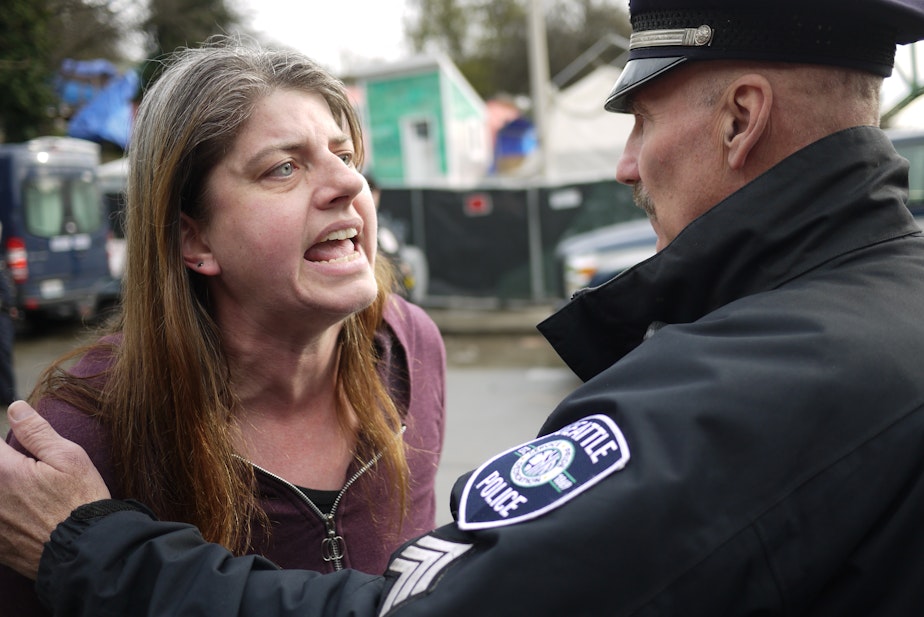Mayoral candidates on unsanctioned homeless camps (they don't all agree)

Whoever is elected as the next mayor of Seattle will inherit a growing homelessness crisis.
Perhaps the most visible markers of this crisis are the tents that line the freeways and nestle in the city’s green spaces.
The city’s response to these unauthorized encampments has become a topic of fierce debate in Seattle.
And, although the positions of the six leading mayoral candidates can seem to blur together on many issues, this is one topic where you can see a clear split in philosophies.
Here’s what candidates have to say about the encampments and the city’s process for clearing them.
Sponsored
"I believe that we should not have unsanctioned camps, and I say that because I think it's immoral to allow those camps to exist."
Durkan said the unauthorized camps are a health and safety hazard and can’t be allowed to persist.
"There's demonstrated needles, rats, human feces, garbage. There has been human trafficking, violence. Why would we let people live there? I think that's wrong."
Durkan said moving people out of unauthorized camps is the right thing to do. She said the city needs to ensure this process is done compassionately, that people keep their belongings, and that they have somewhere to go.
“I am adamantly opposed to sweeps.”
Sponsored
Farrell said clearing unauthorized camps just moves people from place to place around the city.
She said people living on the streets are not receiving the long term housing and service options that they should be.
“I think as we’re sending our police and our parks folks into our parks to move people, we also need to have a much stronger mental health and social work component.”
Farrell said giving people safe alternatives may include more sanctioned encampments and tiny houses.
“The city should start sanctioning them, get them back under control.”
Sponsored
Hasegawa said sanctioned tent camps are self-governed, have codes of conduct, and aim to make sure both campers and the surrounding community are kept safe and happy.
“They actually have become good neighbors with the people living in the neighborhoods who have grown to accept these tent cities.”
Hasegawa said the city should, at the very least, provide sanitation services for unauthorized camps.
He said the city should have the courage to try new models; perhaps organizing tent camps around a central building that provides a bathroom, kitchen and trash cans.
“If you’re going to ask somebody to pick up and leave their tent, or the place where they’re sleeping, there has to be a place to go. And this is the place where we have fallen so far behind.”
Sponsored
When McGinn was mayor of Seattle, encampments were cleared.
“I was prepared to enforce the rules against camping in parks, but I did so with the knowledge that we were opening up new places for people to go."
McGinn said he’d manage the budget more effectively to create more safe alternatives to unauthorized encampments.
“And if you do that, then you can enforce the rules, I believe.”
“There’s a lot of things we could be doing to help folks in unsanctioned encampments get into a more secure place with better services, and we need to make that space first before we do sweeps. If we want to help people out of an unsafe situation, we’ve got to offer them a safer situation to come to.”
Sponsored
Moon said recent data shows 90 percent of the people living on Seattle’s streets would come inside if they’re offered shelter that meets their needs.
“So let’s look at that. What are their needs?”
Moon said the city needs more 24-hour shelters where people can bring pets, partners and belongings. She said expanding tiny house villages and sanctioned encampments are also options.
“I 100 percent think we need to stop the sweeps.”
Oliver said clearing homeless camps is inhumane and re-traumatizes individuals living on the street.
“One strategy acknowledges the human dignity of a person and the other says we don’t value even what little bit of stability you’ve created.”
Oliver said the city's current model doesn't provide enough time for outreach. She said weeks of outreach is needed to build the necessary relationships to get people off the street.
"And we have to accept that that's not going to be time efficient, but what it will be is human being effective. And that's really what we're aiming for — is how can we treat humans with their full human dignity and actually move our city to a much healthier place."
